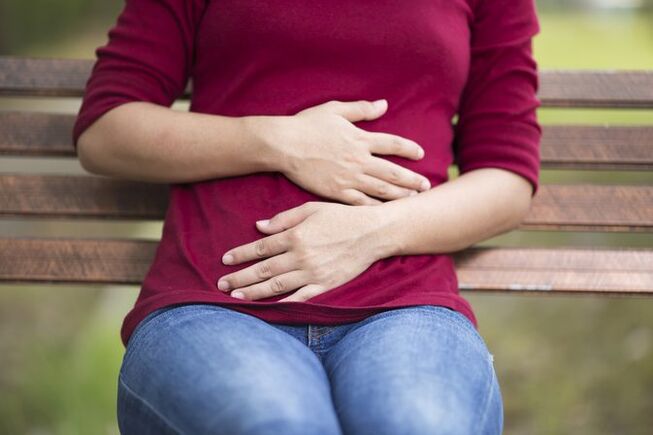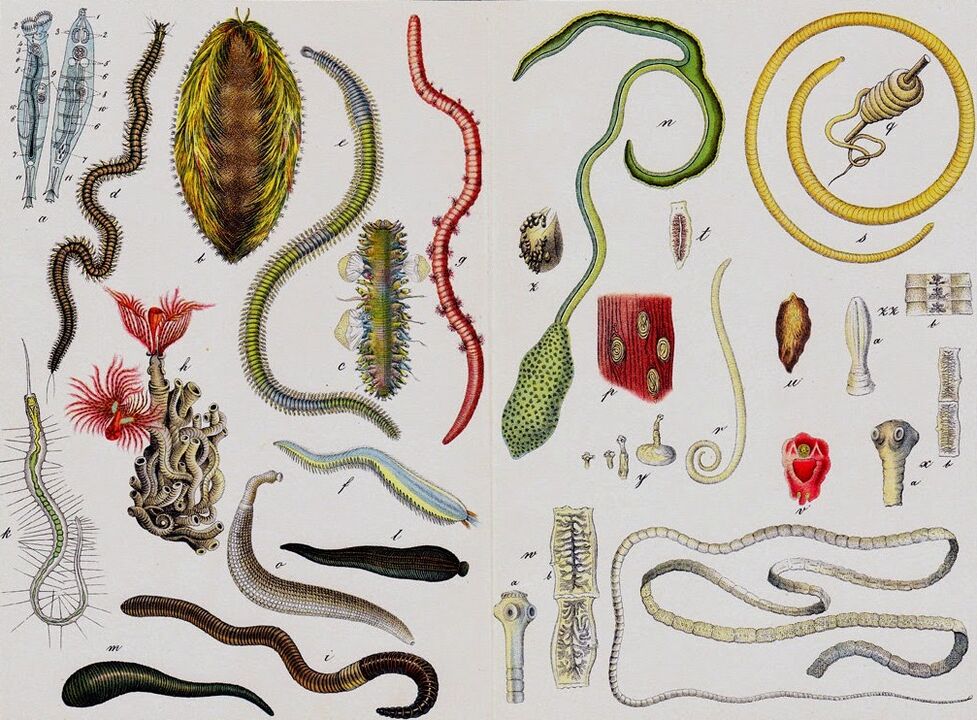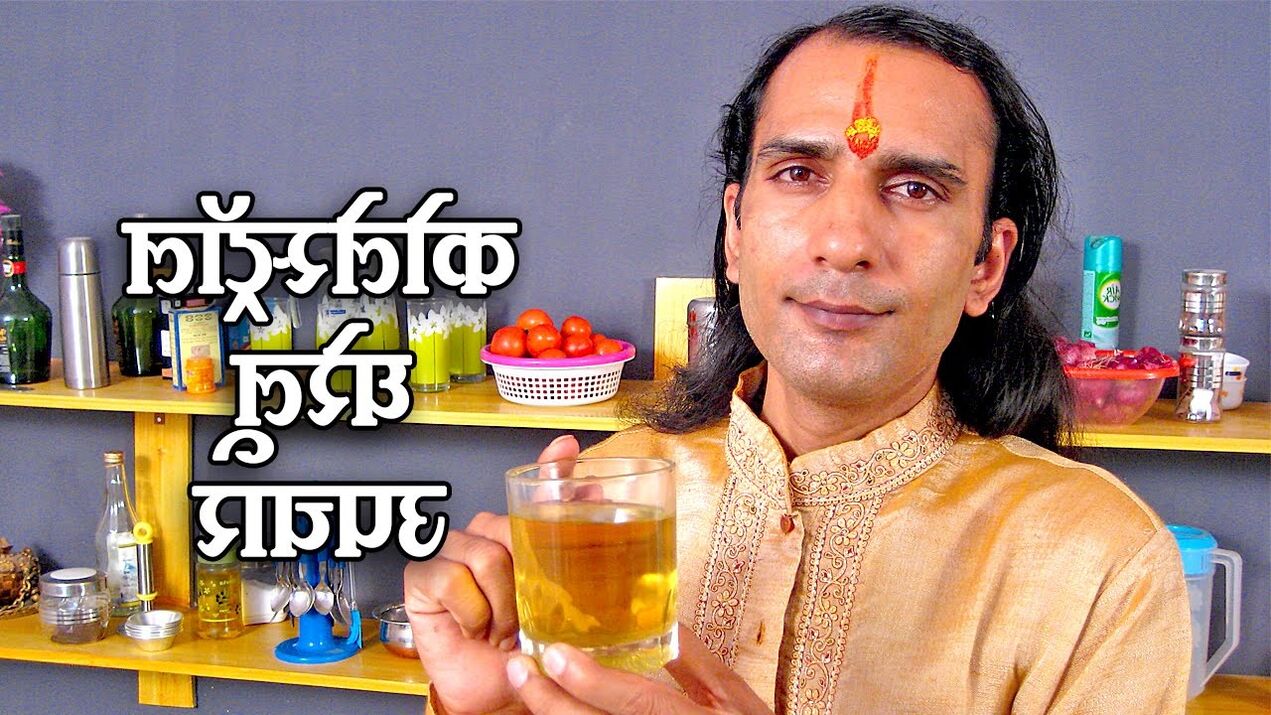In the body of an adult, there are many different living microorganisms. Most of them are beneficial and are our symbionts. They include about 500 species of bacteria that live mainly in the gut. However, many life forms, entering the human body, begin to parasitize and poison the health of the host.
One type of unwanted neighbor is the worm. They are parasitic worms that infect the intestines, liver, lungs, and, in rare cases, muscles. All parasitic worms are collectively known as helminths, and their infection is helminthic.
To answer the question of how to treat worms, it is necessary to understand how they enter the human body. There are main ways of infection:
- Through soil when infected with worms spend part of their life cycle on earth. Their eggs or larvae during development will fall on vegetables and fruits, which will later be eaten. Infested with soil-borne helminths, animals then transfer them to humans.
- When in contact with an infected person. The larvae can be spread through bedding, towels, and other items used by an infected patient. According to statistics, helminths are present in the body of 60% of the population, Asian migrants are a special risk group.
- By eating contaminated meat or fish. The eggs and larvae of the worms are destroyed by prolonged exposure to high temperatures.
- Sometimes insect bites can cause an infection.
When entering the human body, worms actively multiply and excrete toxic wastes. Their accumulation and increase in number give rise to unpleasant symptoms. To get rid of the parasites, you need to see a doctor and undergo a course of treatment.
Signs of worm infection in adults

The presence of parasites in the organs can be determined by external signs. These include skin manifestations that aggravate her condition and cause itching. Examples include inflammation, acne, cracked heels, stratification of the nails.
Worm infections have similar symptoms to other illnesses. Enhancement of various manifestations depending on the location of the helminth. In addition to skin rashes, intestinal disorders are characterized:
- unstable stools;
- specific odor from the mouth, increased gas formation;
- nausea;
- itching in the anus;
- Weight loss parallels an increase in appetite.
The parasite's poison also affects the nervous system, causing headaches and irritability. With a significant increase in the number of individuals of helminths, memory problems and depression can appear. The immune system is not restored due to a lack of vitamins and vital elements. A person often gets sick under the influence of viruses and bacteria. If the respiratory system is affected, attacks of coughing and choking may occur.
If you notice these symptoms, you should consult your doctor. A specialist, using the results of a thorough examination and examination, will determine the form of the parasite and prescribe medication.
Types of parasitic worms in the human body

Treatment of the disease is prescribed depending on the type of parasites that have settled in the internal organs. Many different types of worms affect certain tissues and cause specific symptoms.
The main forms of infection of parasitic worms are distinguished:
- Enterobiasis is formed under the influence of pinworms. Small round organisms colonize the intestines and cause intense itching on the skin of the anus.
- Trichinella enters the muscle through the vascular system. Symptoms appear suddenly and unexpectedly in the form of fever, fever, and swelling of the eyelids and face.
- Vlasoglavy belongs to the roundworm and affects the large intestine. Signs of disease are mild or absent. There may be dizziness, abdominal pain, appendicitis.
- The defeat of tapeworms. These include beef tapeworm, broad tapeworm, and pork tapeworm. Parasites live in the intestines, have different shapes, the body is like a ribbon, divided into many small parts. Characteristic symptoms are dizziness, abdominal pain, stool disorders.
These forms of intrusion are often caused by non-compliance with personal hygiene, poor eating of fried meat. Pets are also a source of parasites.
If the patient shows symptoms of worm infection, the doctor will confirm the diagnosis with the help of laboratory tests. Usually, the stool is examined for helminth eggs and an enzyme immunoassay is performed. In addition, anorectal curettage, laparoscopy and ultrasound can be studied.
Medicines needed to treat worms
If worms are found in the human body, the doctor will prescribe medicine. To recover from the disease, many people turn to traditional medicine. Combination therapy can be used, but its effectiveness will be monitored by a specialist.
The presence of worms in the internal organs is not a dangerous diagnosis if the disease is identified in time and a course of medication is prescribed. Their action will be aimed at destroying the parasites that poison the infected person's body. After removing helminths and their metabolic products, human health is restored.
Due to the need to inhibit parasites, the drug ingredients will have ingredients that affect the ability to absorb nutrients. Lack of nutrition and conditions for reproduction will lead to the death of the worms.
Drugs by type of action on worms are divided into the following types:
- The active ingredients suppress the nervous and muscular systems of the worms. They develop paralysis, they cannot attach themselves to the intestinal wall and are eliminated from the body.
- The drug interferes with the oxidation of glucose in the body of the parasites, which is the cause of their death.
- The drug blocks the formation of cellular tubulin and the synthesis of ATP.
- The drug affects the intestinal system of helminths.
- The component that destroys the shell of the worm. They are exposed to calcium and are digested by the human intestinal system.
There are drugs that are broad-spectrum and target a certain type of worm. The choice of medication is made by the doctor on the basis of tests, the severity of symptoms, and the method of treatment. In addition, the presence of possible contraindications to the use of the drug is taken into account.
In addition, the fund is prescribed to eliminate the manifestations of an allergic reaction to the toxins of the parasite. Taking these pills reduces the degree of poisoning with the waste products of the worms and relieves the symptoms of the disease. Auxiliary components are used individually for the complex course of helminthiasis.
Treatment methods for atypical helminths

The use of drugs is especially effective against worms. The only drawback of drugs is their contraindications. For such situations, non-pharmacological treatment is used:
- Ayurveda;
- oxygen exposure;
- alcohol treatment.
The Ayurvedic system of Indian medicine elevates the general tone of the body, restores vitality and helps fight worms. According to this teaching, the cause of worm infections is the failure to observe personal hygiene and pure thought. Special exercises are used to help maintain health, and the decoction is laxative. Herbs combined with hot spices help cleanse the body of toxins. Having successfully used thyme, wormwood, St. John's wort with a one-week break.
The essence of oxygen therapy is to saturate the cells of the gastrointestinal tract with an appropriate gas. To do this, a tube is inserted into the esophagus and oxygen is pumped through it. The procedure is repeated for several days. Ozone therapy is also used to kill worms. The tube with this method is inserted into the anus. An ozone-oxygen mixture is delivered through it, paralyzing the helminths. Sometimes use olive oil and ozone enema.
Alcoholic beverages are used as an ingredient in treatment. Cognac and tea are mixed in equal amounts, then taken on an empty stomach to laxative. Cognac is used as a stand-alone drug, one tablespoon for five days. Kill helminths infused with vodka with garlic for 10 days.
Traditional medicine methods to treat worms

The variety of folk treatments allows you to choose the best one for each infection. Natural ingredients that affect parasites include:
- Pumpkin seeds and flax seeds combine decoction to drink laxative.
- Infusion of mugwort, pomegranate.
- Phytoncides of garlic and onions.
- Ginger root with sugar.
- Dried cloves, ground in a coffee grinder.
- Steam your face with castor oil and baking soda.
The choice of formula depends on which helminths live in the body. Based on the test results, the parasitologist will select the optimal combination of different treatments.
How to protect from worm infection?
Staying healthy is being able to follow the rules of personal hygiene in all situations. Hands should be washed with soap and water after visiting public places and taking public transport. It is necessary to monitor the cleanliness of underwear and prevent the accumulation of dirt under the nails.

Pets should be dewormed every six months. After contact with feral dogs and cats, it is important to wash hand surfaces with antibacterial soap.
Vegetables and fruits should be eaten thoroughly. Meat and fish should be treated over high heat for at least 40 minutes.
Adhering to these recommendations will help avoid infection and subsequent treatment.





























